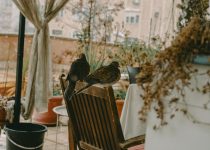Do Rabbits Eat Balloon Flowers in Your Backyard Garden?
Have you ever wondered if rabbits target balloon flowers in your garden? These unique plants might not be the first choice for hungry bunnies. Their thick leaves and milky sap can deter these critters, but that doesn't mean your flowers are completely safe. If you've noticed signs of rabbit activity, it might be time to consider some protective measures. What strategies can you implement to keep your garden flourishing?
Table of Contents
Key Takeaways
- Rabbits generally avoid balloon flowers due to their unique texture and milky sap.
- The thick leaves of balloon flowers are less appealing to rabbits compared to tender greens.
- Minimal rabbit damage is reported by gardeners growing balloon flowers in their gardens.
- Signs of rabbit damage include uneven chewing and clean cuts on the stems.
- To further deter rabbits, consider planting companion plants that they dislike near balloon flowers.
Understanding Balloon Flowers and Their Characteristics
While you might be familiar with various garden plants, balloon flowers (Platycodon grandiflorus) stand out due to their unique, balloon-like buds that bloom into star-shaped flowers.
These perennial plants thrive in well-drained soil and full sun, making them perfect for vibrant garden displays. You'll appreciate their low-maintenance nature, as they resist pests and diseases.
Balloon flowers typically reach heights of 1 to 2 feet, creating a lovely border or focal point in your garden. Their rich, blue-purple color adds charm and attracts various pollinators.
As summer progresses, you'll enjoy watching the buds gradually expand and burst open, showcasing their striking blossoms. Plus, they offer excellent cut flowers, ensuring your garden's beauty continues indoors.
Are Balloon Flowers Attractive to Rabbits?
Are balloon flowers enticing to rabbits, or do they leave them alone? Generally, rabbits tend to avoid balloon flowers due to their unique texture and taste.
While these flowers are beautiful additions to your garden, you may find that they aren't a favorite snack for local rabbits.
Consider these points about balloon flowers and rabbits:
- Rabbits prefer tender greens and vegetables.
- Balloon flowers have a milky sap, which can deter rabbits.
- Their thick leaves aren't as appealing to munch on.
- Many gardeners report minimal rabbit damage.
- Balloon flowers can thrive even in rabbit-prone areas.
Signs of Rabbit Damage in the Garden
Even though balloon flowers aren't typically favored by rabbits, it's still important to be on the lookout for signs of rabbit damage in your garden.
Start by examining your plants for uneven chewing on leaves, which often indicates a nibble from these critters. You might also notice short, clean cuts at the end of stems, a telltale sign of rabbit activity.
Additionally, check for droppings—small, round pellets scattered around can confirm their presence. If you see flattened grass or other plants near your flowers, it could mean rabbits are using that area as their dining spot.
Finally, look for paw prints in soft soil or mulch, revealing their recent visits. Staying vigilant will help you identify any rabbit-related issues early on.
Effective Strategies to Protect Your Balloon Flowers
To keep your balloon flowers safe from potential rabbit munching, you can implement a few effective strategies.
First, consider using physical barriers to protect your plants. Fencing can be a great option, but there are other methods too.
Here are some ideas to help you out:
- Install a fence: Use a tall wire or mesh fence to deter rabbits.
- Use repellents: Spray natural repellents around your garden.
- Plant companion plants: Add plants that rabbits dislike near your balloon flowers.
- Mulch strategically: Use sharp or coarse mulch to create discomfort for rabbits.
- Maintain garden cleanliness: Clear away debris where rabbits might hide.
Alternative Plants That Deter Rabbits
While balloon flowers add beauty to your garden, incorporating alternative plants that deter rabbits can provide an extra layer of protection.
Consider adding herbs like rosemary, sage, and thyme. Their strong scents can keep rabbits at bay. You might also plant marigolds, as their odor is unappealing to these critters.
Another option is lavender; its fragrance is lovely for you but not so much for rabbits. Additionally, try incorporating foxglove and yarrow, which rabbits tend to avoid.
You'll not only enhance your garden's aesthetic but also create an environment that discourages these pesky visitors. By selecting the right plants, you can enjoy your balloon flowers without the worry of rabbit damage.
Frequently Asked Questions
Can Balloon Flowers Be Harmful to Rabbits if Ingested?
If rabbits ingest balloon flowers, it's generally not harmful. However, some plants can cause mild digestive upset. Keep an eye on your rabbits for any unusual behavior after they nibble on unfamiliar plants.
How Do I Identify Balloon Flowers in My Garden?
To identify balloon flowers in your garden, look for their distinctive balloon-shaped buds that burst into star-shaped blooms. The foliage is typically dark green, and the plant grows upright, reaching about one to two feet tall.
What Other Animals Might Eat Balloon Flowers?
Besides rabbits, you might find deer, groundhogs, or various insects nibbling on your balloon flowers. Keep an eye out, as these animals often enjoy the vibrant colors and tender leaves in your garden.
When Is the Best Time to Plant Balloon Flowers?
The best time to plant balloon flowers is in the spring after the last frost. You'll want to choose a sunny spot, prepare your soil, and ensure good drainage for optimal growth and blooming.
Are Balloon Flowers Perennial or Annual Plants?
Balloon flowers are perennial plants, so they'll come back year after year. They thrive in well-drained soil and full sun, making them a great addition to your garden that provides consistent blooms each season.



